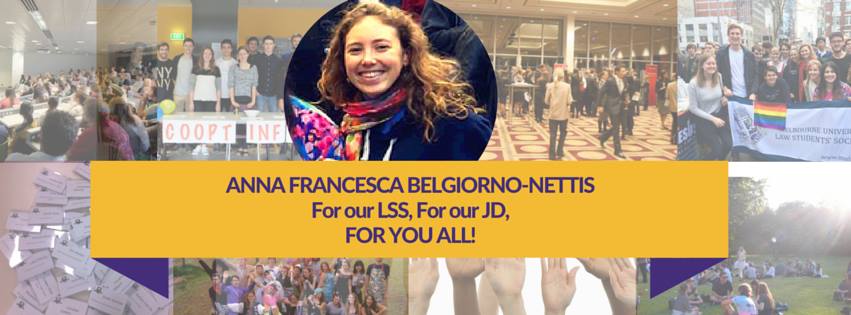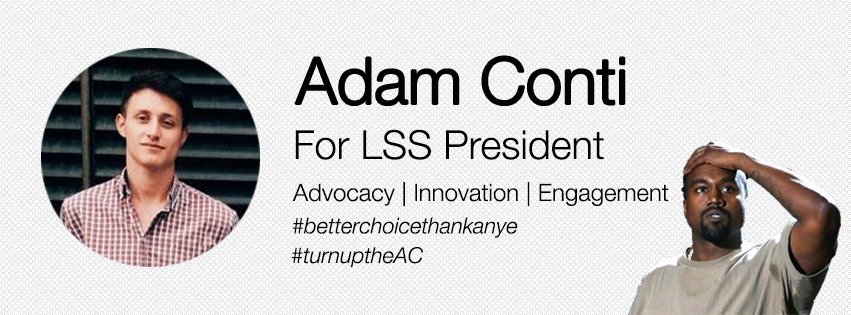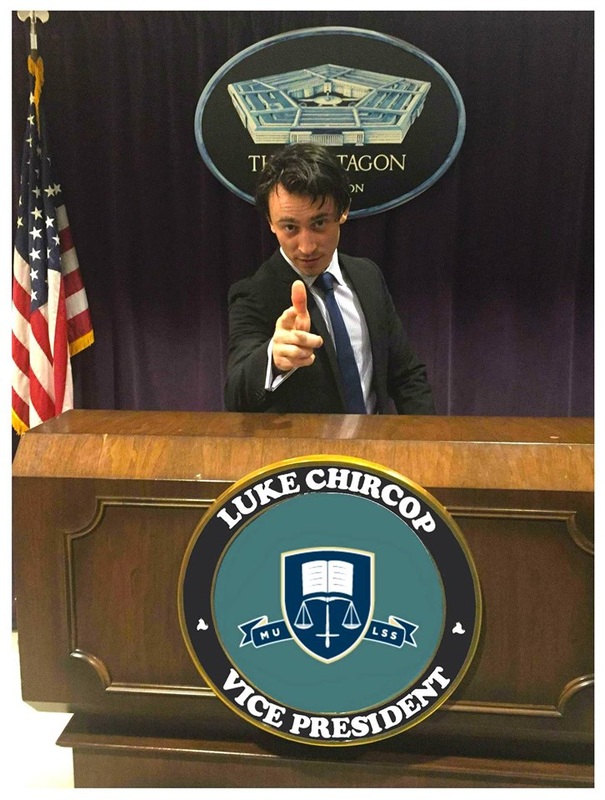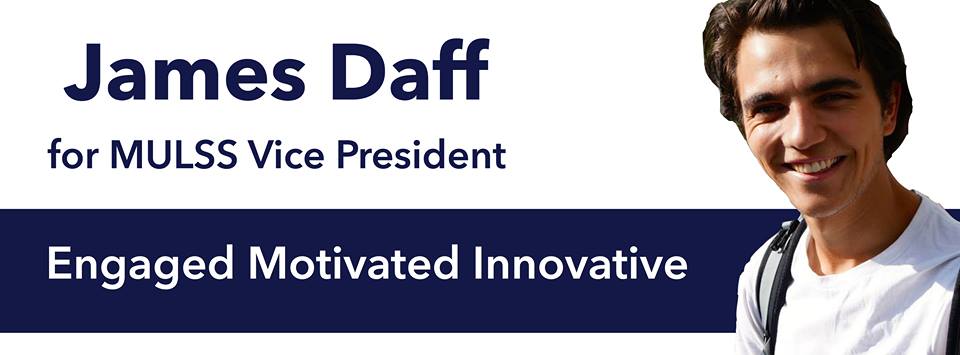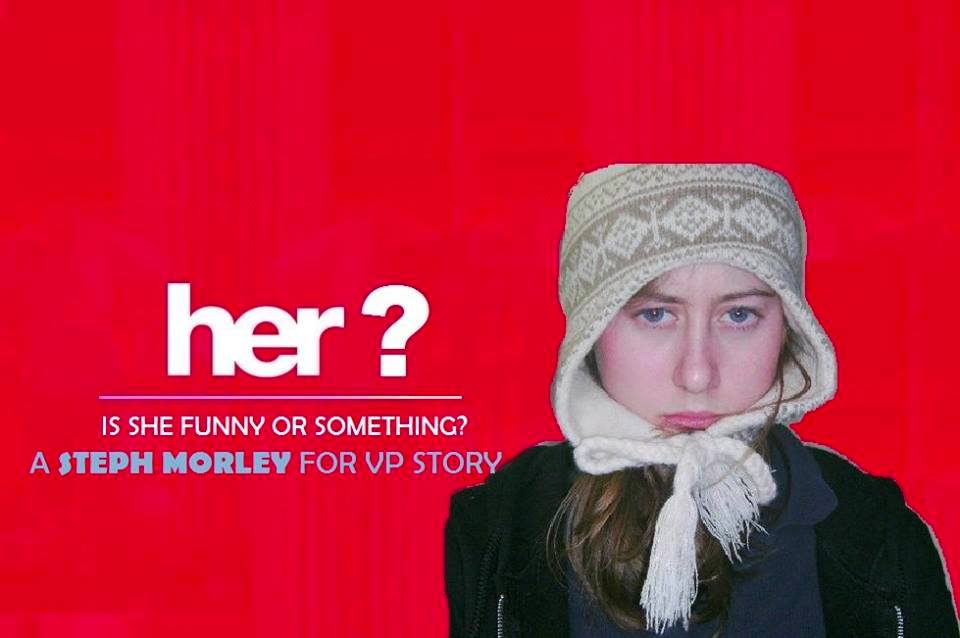|
MULSS Election Candidates Volume 8, Issue 6 INTRODUCTION TO THE ELECTION ISSUE As many of you are no doubt aware, the annual process of electing student representatives to serve on the Melbourne University Law Students Society (MULSS) has begun. Over the remainder of this week, candidates will be campaigning for a number of positions, which are listed opposite. The elections themselves will open at 9 a.m. on Monday 14 September 2015, and close at the end of the week at 2 p.m. on Friday 18 September 2015. This year, the current committee of the LSS has posed a number of questions to candidates for various positions. Their responses provide an insight into the policies they will implement should they be elected. De Minimis has decided, with the cooperation of the LSS, to publish these responses in full. It is hoped that this will allow voters to make an informed choice about who will represent them next year, based on candidates’ policies. All of us here at De Minimis implore you to vote next week, to ensure that next year’s LSS committee is truly a representative body. Hamish Williamson is the Chief Editor of De Minimis. POSITION – PRESIDENT (a) If you are elected President in 2015/16, what are two key policies you would implement during your term? Anna Belgiorno-Nettis Ensuring we have a say on Faculty initiatives: 2016’s going to be busy for Faculty! They’re implementing the ‘Law School Environment’ consultation; (potentially) the removal of the Personal Statement; the JD Curriculum Review (details in (e) – exciting times) and the MLS Building Refurbishment. The LSS is the only body dedicated to informing students about these changes, so you can help decide what shape they take. I’ll ensure this happens by: holding information sessions, listening to you (cue my profile!) and passing that onto Faculty with those liaising skills of mine…(see (c) for more shameless self-promotion) Including each and every one of us: The LSS represents all JD students – whether you occasionally rock up to STS tutorials, or attend every LSS event without fail (which is probably impossible, but you never know...). So it’s vital the Committee prioritises inclusivity. My online voting initiative reflected inclusivity, by giving every JD student an easy voting mechanism, no matter how often or little you’re at MLS. I’d ensure we hear your feedback on major LSS ideas, and respond to what many of YOU want. One issue which I’d apply this policy to is firm branding at LSS events (continued in (f)). Adam Conti (1) Your Focus With Committee, I aim to foster an environment in which the student body feels comfortable, willing and able to express views, concerns and feedback on student issues and LSS initiatives with the Committee. Consequently, the LSS, as a representative organisation, could tailor its objectives to members whilst simultaneously deeply engaging with them. The Committee and I would collaborate to: (a) Encourage expression of diverse perspectives from all members; (b) Streamline multiple communication pathways, including a ‘walk-in’ policy and regular consultation; (c) Discuss the merit and viability of submissions; and, if valid, to (d) Respond efficiently to address and refocus our efforts accordingly. (2) Your Voice To implement Your Focus, I aim to expand the LSS’ historically facilitative role to be more proactive, substantive and representative, and capable of enacting tangible change on issues concerning students both within and beyond MLS. We would build on relationships with external bodies to act as your voice at three levels. The following examples are non-exhaustive. (a) MLS-centric (alongside faculty): curriculum review; health and wellbeing services; BIP; (b) Victoria-wide (alongside Victorian LSS Leadership Council): amendments to LIV Guidelines; ‘L-Card’ initiatives; (c) Nationwide (alongside ALSA): FEE-help cap, oversupply of law graduates. (b) Identify one significant issue faced by the MULSS in 2014/15. How would you have responded differently to this issue and why? Anna Belgiorno-Nettis The ‘women’s space’ issue was the toughest the 2014/15 MULSS Committee had to respond to. I was, to be honest, dismayed by how unproductive and unthoughtful that discussion became – from both sides. It did not reflect how respectful and warm our cohort generally is. The Committee responded well in many ways: the decisions of (i) getting feedback on an important initiative (congratulations to the Women’s Officers) and (ii) passing the issue onto Faculty, as the impartial senior body, were great. As (the first woman) President (in six years!) I would have, however, responded differently by providing a why: why are we considering a women’s space, why are we taking threads off the Facebook page. Saying ‘why’ – with enough detail to see the reasons for actions, without infringing on anyone’s privacy – would’ve decreased the chances of students reacting without understanding, even if not necessarily agreeing. I’d have this attitude to significant issues generally – ensuring the Committee is transparent in providing the ‘why’ to significant LSS actions. [Also, WOW! You’re halfway through this spiel already! Congrats on making it through. If you get to the end you’re a legend. If you then make it to voting, golly that’d be tops]. Adam Conti A significant public issue for MULSS this year was effective management of constructive student discussion on social media. As many know, the JD Facebook pages were platforms on which a survey for responses as to the creation of a women’s space was posited to the JD cohorts. Unfortunately, a combination of misinterpretation and conflicting opinions resulted in vitriol rather than reasoned and respectful debate. Ultimately, the LSS removed some comment threads, to varying degrees of approval and disapproval. Although easily said in hindsight, I would have liked to proactively implement an LSS Social Media Policy, whilst educating and training LSS Committee members (particularly content managers like the Communication Directors) in its operation. Given most LSS communication occurs online, such a policy is something I feel could, and should, have been developed sooner, so as to mitigate social fallout and damaged relationships. It would contain guidelines as to ‘reasonable use’ of LSS social media and reserve rights to warn and temporarily or permanently ban those who engage in abusive, defamatory and indecent conduct. I feel that freedom of expression is no defence to such substandard behaviour. Though the LSS is finalising such a policy, it is an unfortunately reactive response. (c) The role of President involves regular liaison with senior Faculty members (such as the Dean and the Associate Dean (JD)), as well as with external organisations (both solicited and unsolicited). What key experience, training or qualifications do you have that make you an ideal candidate? Anna Belgiorno-Nettis My media background in positions ranging from SBS researcher and Museum of Modern Art intern involved liaising with everyone from Insight host Jenny Brockie to the Wall Street Journal head critics. I realise the importance of professionalism and cordiality in these kinds of collaborations. My role on the LSS Leadership Team (‘LT’) has involved sitting on Faculty’s Wellbeing Committee, attending conferences with Faculty members and helping at LSS-Faculty events. As Secretary, I’m the primary contact for Faculty’s Facilities team which oversees MLS spaces. I’m fortunate to have such a good relationship with Faculty already. Adam Conti I have developed strong interpersonal skills in varied contexts. As Activities Director, I have done a great deal of regular liaising and negotiation, often over months. This has encouraged me to develop enduring relationships with numerous internal and external organisations, including: · LSS members; · Faculty staff; · Companies and businesses; · Law/Medicine student societies; · Alumni; and · Sponsors. Other roles illustrating my interpersonal ability in diverse contexts: · Volunteer at Whittlesea Community Legal Service; · Legal intern at ANZ; · Examiner Liaison at the Victorian Curriculum and Assessment Authority; · VCE tutor and mentor; · Team member at Bunnings. (d) The role of President involves high-level management skills and consistent interaction with all members of the MULSS Committee. In particular, the President is expected to lead by example, but must also be able to oversee and delegate tasks to other elected members at times. What key experience, training or qualifications do you have that make you an ideal candidate? Anna Belgiorno-Nettis I don’t think there’s a position that better prepares you for the President’s role than my current one as Secretary. I’m the go-to person for administrative questions like how President is the go-to for strategic ones. My overseeing has included ensuring Committee members efficiently organise events, from appropriating money to Facebook posting. My delegating has ranged from organising Information Sessions involving all Committee members to improving room booking forms by giving members direct access. As part of the Leadership Team, I’ve already helped at most LSS events this year. I would love to continue leading by this example. Adam Conti My role as Activities Director is dual-faceted, involving high degrees of people management and hands-on work. Alongside James Daff, I coordinated a team of nine to envision, innovate, organise and execute social and sporting events, including the iconic Law Ball and Camp. Delegation and oversight were crucial. Furthermore, I was not afraid of (and strangely enjoyed!) ‘getting my hands dirty’ cutting cheese for Trivia or Garden Party or lugging AV equipment around. I just loved working with the people. Finally, I take pride in the logistical and time-management skills I honed juggling work, study, volunteer, MULR, sporting and sleeping commitments. (e) This year the LSS increased its focus on engagement with MLS and on advocacy on behalf of law students. Do you have any plans to take this further, particularly in the context of the curriculum review currently underway? Anna Belgiorno-Nettis Clearly, as per (a), this is a big priority for me. Reviews are exciting because reviews mean improvement if done well. The first area I’d focus on with the curriculum review is the educational aspect of the JD: the lack of meaningful feedback on major assessments and overall marks needs to be improved. The other area I’d focus on is the ever-important wellbeing factor: I’ll ensure we get our say on the Wellbeing Policy that Faculty’s implementing with this review by holding in-person consultation sessions and giving timely updates on Faculty decisions – to, as above, provide the ‘why’ in a transparent manner. Adam Conti The current curriculum review is a rare chance for students to influence the JD’s content, teaching method, assessment and student and professional perception from 2017 onwards. In this regard the LSS has great scope to represent student interests in consultations with faculty. My plan is: (a) To implement dedicated communication channels beyond SES and those created by Dean Carolyn Evans and Associate Dean Jeannie Paterson (Your Focus) to consolidate and express students’ innovative ideas, praise and critique regarding the curriculum (Your Voice); and (b) For the Education portfolio to take a central, substantive role in improving curriculum quality. (f) There has been debate this year about the propriety of the extent of corporate engagement with the LSS. Do you have a position on this issue and, if so, what changes would you like to see? Specifically, have you considered alternative funding arrangements – for instance, direct student contributions – in order to lessen the present reliance on corporate sponsorship? Anna Belgiorno-Nettis Oo! I’m glad this question came up! In terms of: · Firm branding: I’ve confirmed with relevant LSS members that we’re likely to be able to decrease branding, particularly on Facebook events, without affecting LSS-firm relationships. · Alternative funding: I would not implement student contributions. The JD is already too financially demanding. Contributions could lead to students having to pay to be LSS members, instead of our current automatic membership. However, thanks to careful 2014/15 budgeting and Faculty grants, the 2015/16 Committee will have extra financial resources than in the past, which I’d use to lessen corporate reliance where necessary. Adam Conti In 2014/15, the LSS received $120,000 in corporate sponsorship. My view is that this level of corporate engagement is justified given the LSS’ vast annual expenditure for student services. Whether for good or ill, it is generally the private sector that possesses both resources and motivation to divest it. However, I am wary of its influence, especially given the JD has numerous opportunities beyond the private sector. Rather than ask for direct student contributions, I aim to assess affiliation with the GSA to draw on its substantial funding resources, including the Student Services Amenities Fee our students already pay. POSITION – VICE-PRESIDENT (a) If you were elected Vice-President in 2015/16, what are two key policies that you would seek to implement during your term? Luke Chicorp (1) Focused and frank communication between the student body and the LSS (with faculty involvement when necessary) to help achieve legitimacy in LSS decision-making. This is crucial for a student body often criticised for being unrepresentative. (2) Book Fairy is often elevated as the ‘shining light’ of LSS initiatives. It’s the program through which money is distributed to students with financial difficulty, to help purchase textbooks. But every year, thousands of dollars goes unclaimed by struggling students. There is no shortage of financial need, so the onus is on the LSS to make the program more known and accessible. James Daff (1) Student Engagement I plan on developing greater engagement with the broader student cohort to ensure the MULSS is providing accessible services and support for all students, not just a select few. (2) Advocacy Students are too often informed of faculty decisions after they’ve been made. For example, the removal of the personal statement from the MLS application process. I would seek to create a proactive and ongoing dialogue with faculty to alert students about decisions that affect them, before they are made. This will ensure a greater opportunity for student perspectives to be heard and addressed. Steph Morley (1) Weekly drop-in hours I want to make sure students have a face-to-face contact for any ideas, suggestions or concerns they want to raise. I look forward to organising student access to the leadership team, to be held at specific times, at the LSS office. (2) Handover protocols People struggle with learning their roles on the LSS. To avoid making the same mistakes as our predecessors, I suggest newly elected members spend a whole weekend with outgoing members to learn and plan for the year ahead. This is really important for an organisation with ongoing relationships with external stakeholders. (b) The role of Vice-President requires consistent oversight and management of three MULSS Portfolios and their Directors. In particular, the Vice-Presidents must oversee the Portfolio Directors in a manner that is involved without being overbearing. What key experience, training or qualifications do you have that make you an ideal candidate? Luke Chicorp In my role as Director of Competitions on the 2014/15 LSS Committee I helped oversee a team of 13 officers, who were responsible for running the law school’s various internal competitions. The management role of the Vice President in many ways mirrors my Competitions experience. In both cases, a cohesive team is predicated on affording people the autonomy required to be innovative and creative, with the support necessary to address issues as they arise. James Daff This year I acted as an Activities Director of the MULSS. Alongside Adam Conti, we headed a team of nine, organising and running a wide range of events, including Law Camp and Ball. Leading a large portfolio required balancing directorial oversight, with each team members’ individual autonomy and responsibility to work. I take a friendly and engaged approach to my leadership roles. Respecting each members’ creativity by encouraging and supporting them in implementing new ideas has led to fantastic results for the wider MLS community. For example, the new ‘MULSS Book Club’ initiative was implemented by the first-year Activities co-opts. Steph Morley I think it’s really important not to micro-manage. I worked weekends in a small winery for 5 years, managing the cellar door. I realised that I worked best when I had flexibility and could make decisions, but also knew my boss was there if I needed help. I want to apply that experience on the LSS. I will be someone the portfolio directors can rely on, who is there to collaborate on decisions. Also, I have first aid. Ready for anything.* * ‘Anything’ means ant bites. (c) The role of Vice-President requires consistent attendance at a variety of MULSS events and initiatives. In particular, it requires consistent support of the three Portfolios for which you are responsible. This involves a significant time-commitment (for, eg, attendance at events 2–3 nights per week). How would you manage this time-commitment during your term? In particular, during periods of assessment? Luke Chicorp The nature of law school is that most students are time-poor and over-committed (just ask us, we’ll tell you). And I’m certainly no exception. However, I am extending my degree over 3.5 years, which means that, if elected, I will happily take a lighter subject load next year to compensate for the demanding time-commitment that would come with being Vice-President. James Daff Balancing the demanding role of Activities Director alongside part-time work, university and volunteer commitments has trained me to become very time efficient. I have no misconceptions about the amount of time the MULSS requires. However, I see it as a welcome break from my studies. This mindset ultimately stems from my genuine interest in the initiatives run by the committee. Whether it be the Spring Social or an inspiring speech by Sir Anthony Mason, I am always keen to interact with my community. My key to time management is preparation. I understand how important forward planning is in ensuring busy periods remain manageable later on. Steph Morley I’m very familiar with the time demands of the LSS, both as Education Director and general keeno. Among others, you’ve probably seen me at: · (Corporate firm)’s Wednesday Netball 2014-2015 · Running Club · The Monash-Melbourne Sports Day 2014/Med-Law Sports Day 2015 · Student Tutorial Service tutes · The Sir Anthony Mason Lecture 2014-2015 · Walk for Justice 2014-2015, with the LSS team · Many BBQS (feat. Coles veggie burger) I’ve been balancing assessment and LSS commitments all along. (The author would like you to know that at the time of writing, a crim law assessment was open in an adjacent Word document – Time management skills on tap). Finally, I’m extending my degree so I have more time for the LSS! POSITION – SECRETARY (a) If you were elected Secretary in 2015/16, what is one key policy relating to student engagement with the LSS, both generally and through elections, which you would seek to implement during your term? Rucha Sohani (elected unopposed) Continuing with the brilliant emphasis placed this year on elections; I want to ensure that elections remain as open to everyone as possible. Being an elected committee, it’s important that members are actually ELECTED (ah I know of course - the irony). Therefore, my ultimate goal would be to make sure all positions are contested, helping fulfill the representative nature of the LSS. Making the LSS more approachable is also something that I place great importance on. Ensuring that all students, especially next year’s intake, are comfortable approaching the Committee will help us become as representative as possible. (b) The role of Secretary requires a high-level of organisation and administrative management. What key experience, training or qualifications do you have that make you an ideal candidate? Being Secretary requires strong people and organisation skills that I have managed to accumulate thorough various positions. In particular, my time as First Year Representative allowed me not only to get to know my fellow compadres but importantly, understand LSS initiatives and know them well. Helping in various activities that took place this year opened my eyes to the tremendous work that goes into the different portfolios, something I will continue to do in a greater capacity as Secretary. In addition, I held the position of Treasurer for my Taekwondo club, helping me pickup some invaluable organisational skills. (c) The Secretary’s role includes ensuring the successful management of the MULSS Committee’s internal operations. In particular, it involves ensuring that all members of the Committee adhere to various procedures (such as providing details of appropriations and motions for Committee meetings by the relevant deadlines, or coordinating the LSS’ calendar of events to prevent clashes etc). Imagine an elected Committee Member consistently fails to adhere to these procedures and regularly contacts you at the last minute asking for you to make exceptions to the rules. How would you respond? I do understand that issues are bound to crop up. If a person is consistently failing to adhere to procedures, perhaps they don’t fully understand them and just need some clarification. Or perhaps there are other circumstances out of their control that are unmanageable. Either way, my instinct would be to find out the cause of the problem. This being said, the LSS is a busy Committee and work can easily pile up without warning. If they consistently can’t meet deadlines, this member may need to reconsider their commitments for what is best for themselves and the Committee. We are an elected body and thus we should all ideally be striving to fulfill our obligations to make sure that the Committee can remain as efficient as possible. It would ultimately depend on the circumstances, but I do strongly believe that people should be given the benefit of the doubt. POSITION – TREASURER (a) If you were elected Treasurer in 2015/16, what is one key policy you would seek to implement during your term? Laura Elliot (elected unopposed) One key policy I would seek to implement during my term is a better method for upfront payment of costs associated with the different portfolios’ events and activities. Currently, students often need to pay for event costs from their personal accounts and are later reimbursed. I have experienced first-hand the difficulties with this, as committee members usually don’t have the required personal funds to pay for large transactions upfront. I would like to implement a more seamless process for arranging payment for these costs using the LSS budget to ease the financial burden on students and streamline the process. (b) The role of Treasurer requires familiarity with accounting and financial management. What key experience, training or qualifications do you have that make you an ideal candidate? During my undergraduate degree in Business I studied and became familiar with accounting practices, using software such as MYOB. I was able to build on this knowledge in my role as a business operations analyst at IBM. This involved a large amount of financial tracking and reporting and gave me a solid understanding of financial management. I believe that this education and real-world experience make me an ideal candidate for LSS Treasurer. (c) The Treasurer’s role includes ensuring the MULSS Committee remains financially responsible and accountable throughout its term. Imagine an elected Committee Member approaches you for approval to spend money beyond their budget. How would you respond? It is essential that a buffer is included in the budget to allow for these kinds of situations. However, overspending can quickly become problematic. It would be necessary to consider the purpose of the extra money and the attractiveness of that purpose as a use for LSS funds. Ultimately, I would analyse the desirability of spending LSS funds in the way requested and put my recommendation to the committee for their opinions and approval. POSITION – DIRECTOR OF SPONSORSHIP (a) If you were elected Director of Sponsorship (DoS) in 2015/16, what is one key policy relating to the MULSS’s Sponsorship Portfolio that you would implement during your term? Duncan Burry (elected unopposed) I would like to talk to our ongoing sponsor firms that have pro bono and public interest programs about incorporating these programs, where relevant, into LSS events and initiatives. There has been discussion about reducing the presence of corporate sponsorship but there are practical limitations as sponsorship accounts for a good deal of the LSS’ funding. I propose introducing this public interest element into our sponsorship arrangements as a way to broaden the scope of influence. There has also been a sentiment expressed by a number of students toward different arrangements regarding naming rights of LSS events, which is a matter for negotiation with sponsors. (b) The role of DoS requires regular contact (both written and in person) with external partners and, most typically, HR managers of sponsor firms. It also requires a high-level of familiarly with negotiating sponsorship arrangements. What key experience, training or qualifications do you have that make you an ideal candidate? I have been involved with student societies since my first year of undergrad. In my previous role as one of the LSS Education Directors we had extensive communication with faculty as well as many external parties, particularly with respect to securing Sir Anthony Mason as the guest speaker at his namesake lecture this year. Additionally I have worked as an administrative assistant and subsequently as a research assistant over the last five years. In these roles I have communicated with high-ranking academics and professionals, as well as sorted out complex arrangements in matters such as securing copyrights permissions. I’m real friendly too ;) (c) The DoS’ role includes ensuring the financial security of the MULSS. Typically, a large percentage of the MULSS’ funding has been sourced through corporate sponsorship. Imagine several key sponsors decide to reduce or cease their sponsorship arrangements with the MULSS next year. How would you respond? I will narrow the question to a situation where we have received a hard ‘no’ from a sponsor who we formally had arrangements with. The first response is to consult our treasurer who will have the best idea about the broader implications about this reduction in sponsorship. The other step is to attempt to find other sponsors to pursue an arrangement with. An initiative the outgoing LSS leadership team pursued was non-legal sponsorship arrangements. This could provide an alternate source of funding in situations where an old well has suddenly dried up, as well as fruitfully broaden the range of sponsorship.
Felix Charlesworth
10/9/2015 01:47:06 pm
Abolish the LSS https://www.youtube.com/results?search_query=sex+pistols+anarchy+in+uk
Ollie Reeder
11/9/2015 11:47:00 am
These pitches are almost entirely composed of banal political cliche. The LSS are the intellectual equivalent of the house wine at a suburban Indian restaurant.
Xander Parkarvarkar
12/9/2015 10:22:55 am
Sometimes an $8 bottle of Cab Sav and some butter chicken hits the spot. Comments are closed.
|
Archives
October 2022
|

